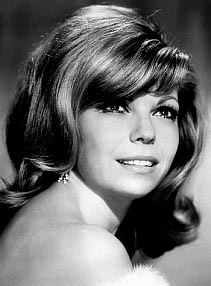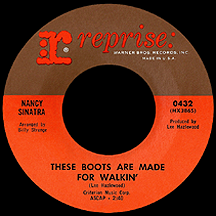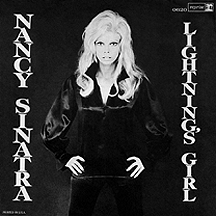NANCY SINATRA
Ask just about anyone who the go-go boot-wearing sex kitten of the '60s was and they'll know the answer: Nancy Sinatra. They may even overlook her connection to a certain guy named Frank, 'cause this girl had it going on despite any family connections! Her rise to fame started in 1944, when Jimmy Van Heusen and Phil Silvers (later Sgt. Bilko of '50s television fame) wrote a song called "Nancy (With the Laughing Face)," presenting it to Frank Sinatra as a gift to his daughter on her fourth birthday. Though his wife had the same first name, Frank recorded the song specifically for young Nancy the following summer and it hit the top ten in December 1945. It was natural for Nancy to show an interest in show business, with attention having turned her way for that brief time during childhood, and in the late 1950s she attended the University of California studying music and dance. Her debut as a performer came in May 1960 on ABC's Frank Sinatra-Timex Show variety special featuring Elvis Presley's return to civilian life after serving two years in the Army. Nancy sang a duet with her father ("Love Makes You Feel So Young") and a solo number, but her main contact with Elvis had been to greet him at the airport when he arrived before the taping of the special.
Nancy's marriage in 1960 to late-'50s singing star Tommy Sands suggested her career might progress no further than the TV special; despite signing a recording contract with her father's Reprise label (founded that year in lieu of extending his Capitol Records contract), success was elusive. Beginning with Aaron Schroeder and Wally Gold's "Cuff Links and a Tie Clip," ten singles were released by Nancy between 1961 and 1965 with no takers. She had more time than most to develop as a performer due to family ties, yet it began to appear that her fate was to raise a family out of the spotlight, much as it eventually became, despite attempts at acting, for younger sister Tina Sinatra.
If "housewife" was meant to be listed at the top of her resumé (though less likely after her divorce from Sands after five years of marriage), it was avoided when an acting opportunity came along. A small part in a 1963 episode of The Virginian starring James Drury was followed later in the year by an appearance in an episode of the Gene Barry detective show/babe-fest Burke's Law. Then came a chance to make a movie; For Those Who Think Young fell somewhere in the middle of a seemingly nonstop string of mid-'60s beach flicks, this one a thinly-veiled imitation of the more popular series starring Frankie Avalon and Annette Funicello. With James Darren as the lead, Nancy's main function in the 1964 film was playing love interest to Bob Denver (who spent most of his time in the mid-'60s on another beach in the hit CBS series Gilligan's Island). She made three more film appearances over the next two years: Get Youself a College Girl, Marriage on the Rocks (starring her dad and Dean Martin) and The Ghost in the Invisible Bikini, in which she performed "Geronimo," backed by The Bobby Fuller Four. These films, taken separately or as a whole, didn't exactly provide the most promising entry into the movie business, but her impact would be greater after she checked a couple more things off her "to do" list.
At least three producers worked with Nancy on her recordings from 1961 to '65: Camarata (who'd had success at Disney's Buena Vista label with Annette and Hayley Mills), Don Costa and former teen idol Jimmy Bowen, working in the mid-'60s as head of A&R for Reprise. They all placed her in the teen category that had worked for so many others, but in Nancy's case it didn't click. Dad or no dad, her contract was hanging by a thread in '65 when longtime writer/producer Lee Hazlewood (best known for helming an impressive run of hits for "twangy" guitarist Duane Eddy) came on board. Along with seasoned arranger Billy Strange, Lee was determined to put Nancy on the charts...which happened on the very first try, all the way up to number 86 with the folk-pop flavored "So Long Babe." It bought them a little more time; Reprise execs wanted to see what they would come up with next.
Hazlewood had already written "These Boots Are Made for Walkin'," which he was sure would be a hit if he could find the right guy to sing it. When Nancy became aware of the song, she tried to convince Lee to let her do it, reasoning that the lyrics would sound demeaning if a man sang them to a woman, but it would be cute and fun coming from a girl. Her father overheard their conversation and agreed. Between the two of them they convinced Lee to let her give it a try. The song hit the charts near the end of January 1966 and caught fire, rising to number one by the end of February. Nancy revamped her image to fit the song's 'gonna walk all over you' tough-girl vibe, bleaching her brunette hair blonde, wearing heavy makeup and mini-skirts, and from that point on she was always seen wearing flashy, colorful calf-high "go-go" boots as her trademark. She even filmed a promo clip of the song wearing black boots and a very short sequined mini-dress. Everyone was talking about her in 1966.
Nancy was skeptical about the follow-up single, "How Does That Grab You, Darlin'?"...too much like "These Boots," she felt, it duplicated the spunky attitude of the previous single yet went top ten despite her doubts. The flip side was the theme for the silver screen spy spoof "The Last of the Secret Agents?" (in which she co-starred with Marty Allen and Steve Rossi), the first of three thematically related movie songs she would perform in the next couple of years. Nancy had a substantial role in this film, then appeared that summer with Peter Fonda in Roger Corman's The Wild Angels. Better roles were coming along after the increased exposure her million-selling hit had given her. More spy antics followed, with a guest shot in a year-end episode of The Man from U.N.C.L.E. playing a character with a name appropriate to her '66 image, "Coco Cool." Two lesser hit singles followed: The bluesy "Friday's Child" and a message song, "In Our Time," then she capped off her breakout year with another top ten smash, the much less dominating and oh-so-cute "Sugar Town." Every one of her hits starting with "So Long Babe" had been written by Hazlewood.

The hits kept coming in 1967, starting early in the year when radio stations began playing the flip side of "Sugar Town," an unlikely western saga called "Summer Wine." A duet with Lee Hazlewood (who had previously sung on record without coming anywhere close to the success of his producing and writing efforts), its popularity led to follow-up hits for the duo including "Jackson" (a country hit earlier in the year by Johnny Cash and June Carter, and the first of Nancy's hit singles not composed by Lee) and "Lady Bird." Besides what became a reglar duet partnership with Hazlewood, she recorded a one-shot single with her dad (their first duet since the one they performed on the 1960 TV special) billed as Nancy Sinatra and Frank Sinatra, and it wound up being the biggest hit of her career. "Somethin' Stupid" was a brilliantly crafted pop ballad with romantic overtones that no one took the wrong way. Written by C. Carson Parks, it hit number one in April 1967 and was nominated for Grammy's top honor, Record of the Year (bringing Nancy's total nominations to three, after receiving two for "Boots" the previous year).
The conversely different Hazlewood creations "Love Eyes" and "Lightning's Girl" were also hits that year, but an opportunity came Nancy's way in 1967 that solidified her permanent place (beyond "Boots") in '60s pop culture. She recorded the John Barry-Leslie Bricusse theme song for "You Only Live Twice," the fifth film in the James Bond series starring Sean Connery, putting her in a class with Matt Monro, Shirley Bassey and Tom Jones, who'd done the themes for the three previous Bond romps. By year's end, she'd released yet another musical contribution to the detective/spy movie genre, the theme from the Frank Sinatra vehicle "Tony Rome," and this time Hazlewood got the writing assignment. As if she wasn't already busy enough, she formed a production company, Boots Enterprises, Inc., and starred in a variety special, Movin' With Nancy, which aired on NBC in December.
Another Nancy and Lee duet, the ethereal "Some Velvet Morning," was her last top 40 hit in early 1968. That summer she crossed paths with Elvis Presley again, starring opposite him in Speedway, her biggest movie yet, pulling off a coup by becoming one of only two female co-stars (Ann-Margret in 1964's Viva Las Vegas being the other) to sing a duet with the King himself in one of his films ("There Ain't Nothing Like a Song") and as a bonus secured a solo spot ("Your Groovy Self"). Oddly, though, it was the last film she acted in. After this she released several good singles written by Hazlewood and others, including Mac Davis and Delaney Bramlett, taking her run on the charts to the final months of 1969 and no further.
I have a preference for artists whose body of work follows an arc of variety, in song selection and stylistic approach. Nancy could have strutted around in her boots for several months and a few singles, only to wander off into the sunset like many acts have unintentionally done. Instead she went in another direction by the end of '66, giving us a taste of "Sugar," followed by engaging duets with Hazlewood, Elvis and her dad, some cool movie themes, folk rock and country songs, and a few campy but fun propositions accomplished with the help of Lee Hazlewood and others. It would have been easy to ride on the Sinatra name, taking lightly any ability she may have inherited from her famous father in place of something deeper. But it wasn't necessary. Nancy Sinatra has her own distinct brand of talent and charisma. She's an original.
NOTABLE SINGLES:
- Cuff Links and a Tie Clip - 1961
- Like I Do - 1962
- So Long Babe - 1965
- These Boots Are Made for Walkin' - 1966
- How Does That Grab You, Darlin'? /
The Last of the Secret Agents? - 1966 - Friday's Child - 1966
- In Our Time - 1966
- Sugar Town - 1966 /
- Summer Wine - 1967
with Lee Hazlewood - Love Eyes - 1967
- Somethin' Stupid - 1967
with Frank Sinatra - Jackson - 1967
with Lee Hazlewood / - You Only Live Twice - 1967
- Lightning's Girl - 1967
- Lady Bird - 1967
with Lee Hazlewood - Tony Rome - 1967
- Some Velvet Morning - 1968
with Lee Hazlewood - 100 Years - 1968
- Happy - 1968
- Good Time Girl - 1968
- God Knows I Love You - 1969
- Here We Go Again - 1969
- Drummer Man - 1969



